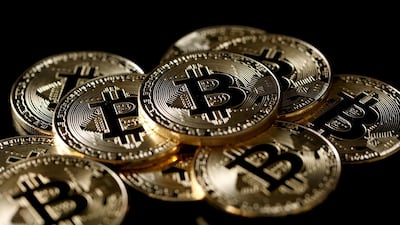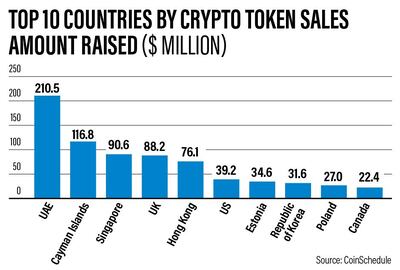Token sales in the UAE may gain further traction with companies looking to raise capital rather than take on the high costs of initial public offerings, according to industry experts. However challenges remain.
"An IPO is a very lengthy and expensive process … completely out of the reach for many enterprises in the UAE," Irina Heaver, executive vice president of group general counsel at UAE-headquartered investment firm Bolton Holdings, told The National.
“With emerging technologies such as blockchain, smart contracts are used to design tokens that are sold to investors. They are quick, within the reach of SMEs and an attractive capital formation option [rather] than going for an IPO.”
Two companies in the UAE raised nearly $210.5 million in token sales this year to the end of April – accounting for almost a quarter of the total capital amassed globally, according to the data compiled by UK-based CoinSchedule that provides blockchain intelligence. The UAE raised the most worldwide, followed by the Cayman Islands ($116m), Singapore ($90m), the UK ($88m) and Hong Kong ($76m).
Token sales involve selling a token or a digital cryptocurrency to investors to raise funds. Raised capital is used for the purposes outlined during the token sale, for example – technology development or asset acquisition.
"Being a hub of finance and technology in the Middle East, it will not be surprising to see UAE experiencing a fast uptick in the demand for token sales in the coming days. Blockchain companies will be attracted by a clear and not excessively restrictive regulatory framework," Andrea Bonaceto, chief executive of Eterna Capital, a London-based fund management firm, told The National.
Tokenisation allows the transfer of assets from peer to peer without the need of intermediaries, said Mr Bonaceto, adding, “They [tokens] can represent assets, businesses and products ... and [this] has also led to new business models, which were previously not possible.”
Hans Fraikin, chief executive of Abu Dhabi-based Libra Project, which is issuing equity tokens in green utility infrastructure, has a word of caution.
He said it is important to distinguish between "funds raised in token sales", and "number of token sold".
"These are two different statistics," said Mr Fraikin.
“SCA [Securities and Commodities Authority], the UAE’s federal capital markets regulator, is yet to pass legislation regulating the trading of digital securities. Once this happens, which is expected to be in a matter of months, undoubtedly the UAE’s position as a ‘token sales’ hub will rise to the position of world leader,” added Mr Fraikin.
“We will be tokenising our renewable energy project assets as soon as the authorities approve digital securities trading.”
Bolton Holding, which raised $67.8m during its first tranche of the digital tokens sale in the first four months of 2019, said part of the capital was raised out of the UAE. It added that token sales would gain momentum once there are supporting regulations.
“Coming up with the regulatory regime for tokenised securities or tokenised commodities will bring a lot of intellectual and financial capital into the UAE," said Ms Heaver.
She added that this region still prefers to invest in the traditionally safe sectors, such as education, hospitals and real estate and needs a strong push to move towards tokens. The other company Genesis Crypto Blockchain Investment Bank (GCBIB) raised Dh142.7m.



